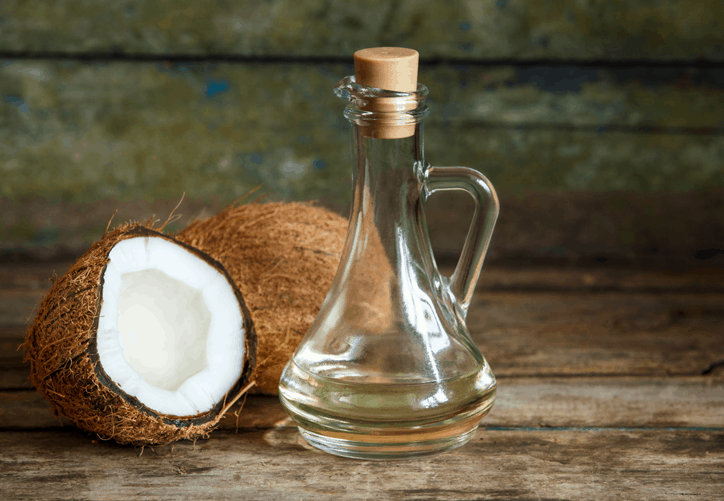
Cooking with Coconut Oil for Health
Cooking with coconut oil can be great for athletes and anyone who needs to eat a lot of calories, as well as for people with fat malabsorption issues due to low levels of the enzyme lipase. This is because the fats in coconut oil appear to be well absorbed even when lipase activity is low.[1] Because the fat in coconut oil is digested slowly and releases energy gradually, this also supports greater absorption of fat-soluble nutrients.[2]
Coconut oil not only appears to be easier on the digestive system and better for cardiovascular health than many types of fat, it may even help support immune function. The fats in coconut oil can disrupt cell membrane activity in several viruses including Staphylococcus aureus (when applied topically).[3]
The fats in coconut oil can also be converted to ketones, which act as an important alternative energy source in brain tissue. In one study, older adults who consumed 40 mL of coconut oil daily performed better on cognitive tests than those not receiving the coconut oil, particularly in the areas of orientation and language construction.[4]
What You Need to Know About Cooking with Coconut Oil vs. Olive Oil
When we cook with fats, oxidation, hydrolysis, and other chemical reactions occur. These reactions produce volatile compounds that have a range of effects on human health. The smoke point of a cooking oil (the temperature at which it produces a continuous smokey wisp) relates to the level of free fatty acids in the oil and the production of volatile compounds.[5] As such, it’s best to choose a cooking oil with a suitable smoke point for the style of cooking. It’s also a good idea to use an extraction fan while cooking to help get rid of airborne volatile compounds.
Because cooked fats contain more free fatty acids, it’s best not to reuse cooking oils as the smoke point will be lower and more volatile compounds will be created with each use.[6]
Fats with a higher smoke point (above 200 degrees) are a good choice for deep frying at higher temperatures. Light olive oil has a smoke point over 200 degrees (regular olive oil has a smoke point below 200). The smoke point of coconut oil is 177 degrees, meaning that it’s best suited for shallow frying at a lower temperature.[7]
Polyunsaturated fatty acids (PUFAs) are also important for health and are generally associated with a decreased risk of poor cardiovascular health, but their low smoke point makes them unsuitable for cooking. So, in conclusion, when choosing cooking fats, you’d do well to ditch the butter and animal fats, and replace them with coconut oil or olive oil.
References:
[1] Assunção, M.L., Ferreira, H.S., dos Santos, A.F., et al. (2009). Effects of dietary coconut oil on the biochemical and anthropometric profiles of women presenting abdominal obesity. Lipids, Jul; 44(7):593-601.
[2] Boateng, L., Ansong, R., Owusu, W. B., & Steiner-Asiedu, M. (2016). Coconut oil and palm oil’s role in nutrition, health and national development: A review. Ghana Medical Journal, 50(3):189–196.
[3] Verallo-Rowell, V.M., Dillague, K.M., Syah-Tjundawan, B.S. (2008). Novel antibacterial and emollient effects of coconut and virgin olive oils in adult atopic dermatitis. Dermatitis, Nov-Dec;19(6):308-15.
[4] De la Rubia Ortí, J.E., Sánchez Álvarez, C., Selvi Sabater, P., et al. (2017). How does coconut oil affect cognitive performance in alzheimer patients? Nutr Hosp, Mar 30;34(2):352-356.
[5] Gunstone, F. (2011). Vegetable oils in food technology: composition, properties and uses. John Wiley & Sons; 2011.
[6] Katragadda, H.R., Fullana, A., Sidhu, S., & Carbonell-Barrachina, Á.A. (2010). Emissions of volatile aldehydes from heated cooking oils. Food Chem, 120(1):59–65.
[7] Culinary Institute of America, author. The New Professional Chef. 6 ed. New York: John Wiley & Sons; 1996.

Cooking with Coconut Oil for Health
Cooking with coconut oil can be great for athletes and anyone who needs to eat a lot of calories, as well as for people with fat malabsorption issues due to low levels of the enzyme lipase. This is because the fats in coconut oil appear to be well absorbed even when lipase activity is low.[1] Because the fat in coconut oil is digested slowly and releases energy gradually, this also supports greater absorption of fat-soluble nutrients.[2]
Coconut oil not only appears to be easier on the digestive system and better for cardiovascular health than many types of fat, it may even help support immune function. The fats in coconut oil can disrupt cell membrane activity in several viruses including Staphylococcus aureus (when applied topically).[3]
The fats in coconut oil can also be converted to ketones, which act as an important alternative energy source in brain tissue. In one study, older adults who consumed 40 mL of coconut oil daily performed better on cognitive tests than those not receiving the coconut oil, particularly in the areas of orientation and language construction.[4]
What You Need to Know About Cooking with Coconut Oil vs. Olive Oil
When we cook with fats, oxidation, hydrolysis, and other chemical reactions occur. These reactions produce volatile compounds that have a range of effects on human health. The smoke point of a cooking oil (the temperature at which it produces a continuous smokey wisp) relates to the level of free fatty acids in the oil and the production of volatile compounds.[5] As such, it’s best to choose a cooking oil with a suitable smoke point for the style of cooking. It’s also a good idea to use an extraction fan while cooking to help get rid of airborne volatile compounds.
Because cooked fats contain more free fatty acids, it’s best not to reuse cooking oils as the smoke point will be lower and more volatile compounds will be created with each use.[6]
Fats with a higher smoke point (above 200 degrees) are a good choice for deep frying at higher temperatures. Light olive oil has a smoke point over 200 degrees (regular olive oil has a smoke point below 200). The smoke point of coconut oil is 177 degrees, meaning that it’s best suited for shallow frying at a lower temperature.[7]
Polyunsaturated fatty acids (PUFAs) are also important for health and are generally associated with a decreased risk of poor cardiovascular health, but their low smoke point makes them unsuitable for cooking. So, in conclusion, when choosing cooking fats, you’d do well to ditch the butter and animal fats, and replace them with coconut oil or olive oil.
References:
[1] Assunção, M.L., Ferreira, H.S., dos Santos, A.F., et al. (2009). Effects of dietary coconut oil on the biochemical and anthropometric profiles of women presenting abdominal obesity. Lipids, Jul; 44(7):593-601.
[2] Boateng, L., Ansong, R., Owusu, W. B., & Steiner-Asiedu, M. (2016). Coconut oil and palm oil’s role in nutrition, health and national development: A review. Ghana Medical Journal, 50(3):189–196.
[3] Verallo-Rowell, V.M., Dillague, K.M., Syah-Tjundawan, B.S. (2008). Novel antibacterial and emollient effects of coconut and virgin olive oils in adult atopic dermatitis. Dermatitis, Nov-Dec;19(6):308-15.
[4] De la Rubia Ortí, J.E., Sánchez Álvarez, C., Selvi Sabater, P., et al. (2017). How does coconut oil affect cognitive performance in alzheimer patients? Nutr Hosp, Mar 30;34(2):352-356.
[5] Gunstone, F. (2011). Vegetable oils in food technology: composition, properties and uses. John Wiley & Sons; 2011.
[6] Katragadda, H.R., Fullana, A., Sidhu, S., & Carbonell-Barrachina, Á.A. (2010). Emissions of volatile aldehydes from heated cooking oils. Food Chem, 120(1):59–65.
[7] Culinary Institute of America, author. The New Professional Chef. 6 ed. New York: John Wiley & Sons; 1996.
